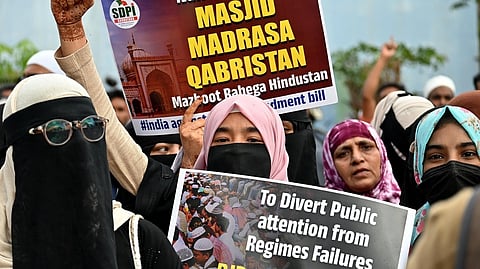

“The past holds us together; why should the present or the future divide us in spirit?”
Jawaharlal Nehru, convocation address at Aligarh Muslim University, January 24, 1948.
The Waqf (Amendment) Act 2025—titled the Unified Waqf Management, Empowerment, Efficiency and Development (UMEED) Act—has been passed by the Union government with the stated aim of streamlining waqf administration. Yet, behind this innocuous acronym lies a deeply troubling legislative overreach. Far from empowering communities, the Act spells U for Unconstitutional restrictions, M for Marginalisation of religious autonomy, E for Exclusion from spiritual practice, another E for Erosion of precedent, and D for Discriminatory governance.
The legislation fundamentally alters the principles that have long guided waqf creation and management. It introduces restrictive eligibility criterions, disproportionately empowers secular authorities and blurs the lines between state oversight and religious self-governance. This is not reform—it is rupture.
One of the most concerning provisions is the imposition of a five-year requirement of practising Islam for anyone seeking to create a waqf. This arbitrary threshold is not grounded in Islamic jurisprudence, and contradicts both constitutional guarantees and lived spiritual realities. It excludes recent converts, those returning to faith, and others who may not fit into narrow state definitions of religious practice. In doing so, the provision violates Article 14 (equality before law) and Article 25 (freedom of religion), erecting bureaucratic barriers to an act of faith.
Further, the enhanced role of state authorities in waqf administration—particularly vesting final decision-making powers in district collectors—raises serious constitutional concerns. Waqf is a religious endowment; to hand over its governance to secular administrative officers is to undermine Article 26, which guarantees every religious denomination the right to manage its own affairs. Petitions now before the Supreme Court argue that this represents an illegitimate transfer of control over sacred property to the state, in violation of both religious and property rights protected under Article 300A.
Equally alarming is the ambiguity surrounding the status of Waqf-by-user—a concept firmly rooted in Islamic practice and judicial precedent. This doctrine, previously affirmed by the Supreme Court, allowed properties to attain waqf status through continuous religious use over time, even in the absence of formal documentation.
However, legal experts and petitioners now argue that the amended framework sidesteps or obscures this principle, raising fears that long-recognised waqf properties may lose their protected status. Such a departure not only challenges the lived religious practices of communities, but also risks violating established interpretations of property rights under Article 300A and religious autonomy under Article 26.
Another deeply contentious change is the mandatory inclusion of non-Muslim members on waqf boards and the Central Waqf Council. This is an unprecedented intrusion into the internal management of a religious community’s institutions. Hindu endowments continue to be governed exclusively by Hindus under various state enactments—yet Muslims alone are subjected to this new regime of mixed composition. This discriminatory distinction erodes the constitutional promise of equal treatment of all faiths.
Legal challenges to the Act have surged since its passage. Petitioners including the IUML and DMK MPs have moved the Supreme Court, arguing that the Act violates Articles 14, 15, 25, and 26. DMK’s Deputy General Secretary Thiru A Raja, a member of the Joint Parliamentary Committee on the Bill, has submitted that the legislation infringes upon the religious and property rights of over 50 lakh Muslims in Tamil Nadu and 20 crore Muslims across India.
In Tamil Nadu, the resistance has been both swift and principled. On March 27, the Tamil Nadu assembly, under the leadership of Chief Minister M K Stalin, passed a resolution unequivocally opposing the Bill and urged the Union government to withdraw it. The resolution reiterated that the amendments compromise religious freedom, infringe on the autonomy of religious institutions, and violate the federal compact between the Union and states.
The larger concern here is the Union government’s growing tendency to centralise and control domains that are inherently local, communal and spiritual. Waqf properties have historically been managed by the community for purposes of charity, education and welfare. To replace this with a top-down bureaucratic framework devoid of community trust and spiritual insight is not governance—it is disenfranchisement.
Reform is not the problem; reform without representation, consultation and constitutional fidelity is. If transparency was the goal, the process would have included voices from the community, state governments, legal scholars and practitioners. Instead, what we witness is a unilateral rewriting of how a religious community relates to its sacred institutions.
What is unfolding is governance by exclusion. The Union government must realise that hope or umeed cannot be legislated through acronyms. Hope is built when communities are empowered, not overridden; when states are trusted, not bypassed.
We demand the immediate withdrawal of the Act, a comprehensive consultation with states and community stakeholders, and a recommitment to the founding ideals of our republic. Otherwise, the only thing this Act will “unify” is the resistance against the erosion of rights and democracy.
Thamizhachi Thangapandian
MP from South Chennai and a member of the Parliamentary Standing Committee on Education
(Views are personal)